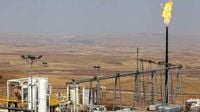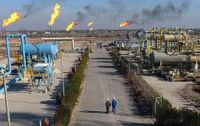The Iraqi Oil Ministry has taken a firm stance against accusations from the Kurdistan Oil Industry Association, known as APIKUR, which claimed that the ministry was unwilling to negotiate contracts with the Kurdistan Regional Government (KRG). In a statement released on Friday, April 4, 2025, the ministry described APIKUR's assertions as "flawed and misleading." This declaration comes amidst ongoing tensions over oil revenue-sharing and export agreements between Baghdad and Erbil.
In its statement, the ministry reaffirmed its commitment to implementing the amendment to the general budget law issued on February 2, 2025. This amendment stipulates that all oil produced in the Kurdistan region must be delivered to the Iraqi Oil Marketing Company (SOMO). In return, the KRG would be compensated for production and transportation costs based on a fair international valuation.
The Iraqi government has faced significant challenges in exporting oil through the Iraq-Turkey pipeline, which has been halted since March 2023 due to a court ruling that mandated Turkey to pay Iraq approximately $1.5 billion for transporting oil without Baghdad's approval. This ruling has intensified the long-standing disputes over oil revenue rights between the federal government and the KRG, leading to a loss of around $19 billion in potential revenue during the pipeline's closure.
In its latest statement, the Oil Ministry emphasized the importance of resuming oil exports through the Iraq-Turkey pipeline swiftly and responsibly. It warned against the illegal sale of oil, which it considers a violation of Iraqi citizens' rights. The ministry stated, "Selling oil in illegal ways is an attack on the rights of the Iraqi people," as asserted by Prime Minister Muhammad Shiaa Al-Sudani.
Negotiations have been stalled due to what the ministry described as "unrealistic" demands from unnamed parties, despite some progress in earlier discussions. The ministry has called for an urgent meeting with all relevant stakeholders to resume negotiations within the framework of the amended budget law, ensuring Iraq's sovereignty and rights while also fostering investor confidence.
On February 25, 2025, the ministry announced plans to begin receiving approximately 185,000 barrels per day from the Kurdistan region as part of an initial phase following the resumption of exports through the Turkish port of Ceyhan. The pipeline had previously transported around 450,000 barrels per day before operations were suspended.
Washington has been actively urging Iraq to resume oil exports, with reports indicating that the Trump administration had pressed Baghdad to agree to restart flows or face potential sanctions. In light of this pressure, the Iraqi Oil Ministry is striving to demonstrate good faith in negotiations to ensure a stable and legal framework for oil sales.
The Kurdistan Oil Industry Association, representing eight oil companies operating in the region, has stated that it will not resume exports until Baghdad guarantees compliance with existing contracts and settles outstanding payments for previous and future exports. This impasse highlights the complexities of the relationship between the federal government and the KRG, which has been fraught with disputes over oil revenues for years.
The Oil Ministry's recent statement reflects its commitment to finding a fair and sustainable solution that serves the interests of all parties involved, including international oil companies. It reiterated the need for an attractive investment environment that supports economic development in Iraq.
The ministry has expressed its willingness to work collaboratively to resolve outstanding issues and has emphasized the importance of adhering to legal frameworks in oil transactions. The Iraqi government aims to protect national resources from illegal exploitation while ensuring compliance with the amended budget law.
As negotiations continue, the ministry remains hopeful that a resolution can be reached that allows for the resumption of oil exports through the Iraq-Turkey pipeline, which is crucial for the economic stability of both the Kurdistan region and Iraq as a whole. The outcome of these discussions will significantly impact the future of oil production and revenue-sharing arrangements in the region.
In conclusion, the Iraqi Oil Ministry's proactive approach to addressing the challenges surrounding oil exports from the Kurdistan region underscores the complexities of managing oil resources in a politically sensitive environment. The ministry's call for urgent negotiations reflects a desire to find common ground and ensure that Iraq's oil wealth serves the interests of all its citizens.








